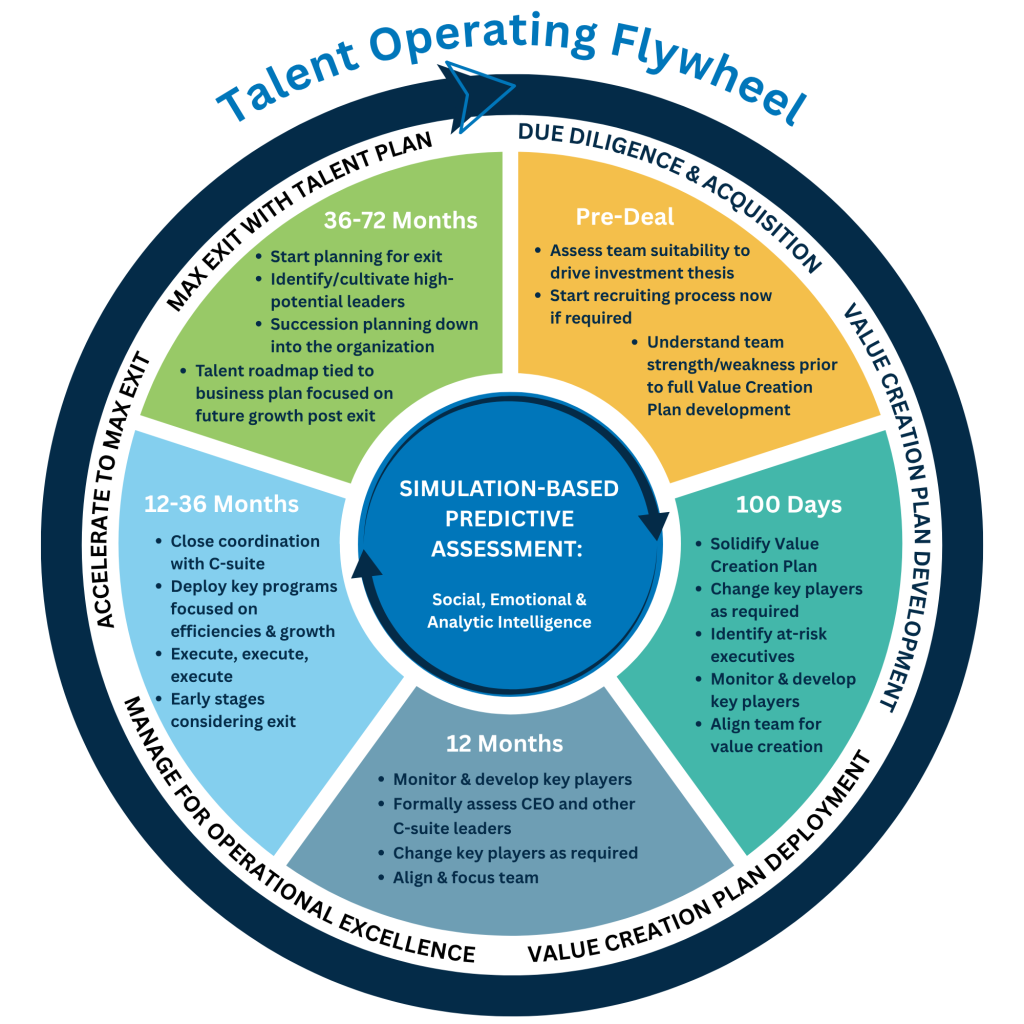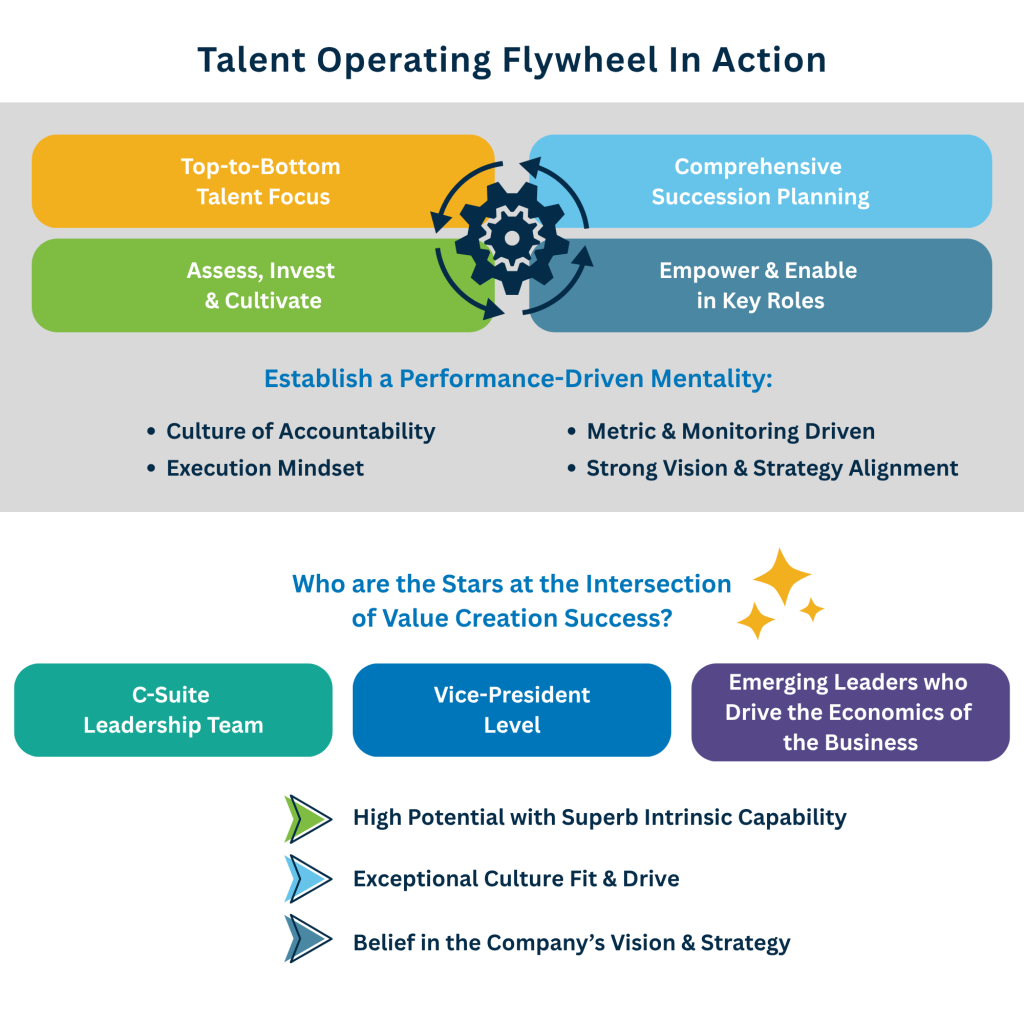Private equity (PE) firms face more pressure than ever to create value. They’re holding companies longer and paying premium prices in an uncertain market with weak liquidity. This intensifying trend means PE firms must work harder than ever to:
- Create tangible and sustainable value in their portfolio companies.
- Deliver aggressive returns to meet investors’ expectations.
- Build and retain strong leadership teams across their portfolios.
- Create and promote high-performance cultures across their investments.
- Prove to Limited Partners (LPs) that they can deliver returns in up and down markets.
The Critical Role of Talent
While talent matters throughout ownership, investors are now realizing how crucial it becomes at exit. Buyers scrutinize leadership capability closely, knowing that strong teams drive better returns. A strong talent strategy affects sale prices through:
- Well-defined succession plans for key roles.
- Leadership assessment at all levels.
- Development paths for high-potential leaders.
- Thoughtful and strategic organizational design.
- Well-articulated culture evolution plans tied to overall growth plan for the entity.
Unlike in corporate environments where human resources (HR) and other initiatives can be somewhat mandated from the top, PE firms must cultivate the right strategic and tactical thinking in their portfolio companies, so talent planning is more assertively adopted and linked to value creation throughout the investment cycle.
A Systematic Approach to Talent
Creating value through talent requires more than good intentions – it takes a system. That’s where a Talent Operating FlywheelTM comes in. A Talent Operating Flywheel is a strategic framework that connects talent decisions directly to a value creation plan and creates momentum at all levels in the organization to enable excellence and accelerated execution. It provides a clear road map for assessing, developing, and aligning leadership to drive financial performance for each portfolio company at every stage of the investment lifecycle. With it, PE firms can systematically fill critical roles, create high-impact succession plans, identify and elevate high-potential leaders at all levels who can drive business performance, and enable high-powered teams that exceed value creation expectations.

Rather than a one-off effort, the Flywheel is a continuous process that spans the entire hold period, optimizing the purchase price at exit. It helps uncover the talent-related drivers of value creation by addressing:
- Current leadership capabilities.
- Performance improvement needs.
- Cash flow acceleration requirements.
- Transformation priorities.
- Growth strategy alignment.
These insights shape high-stakes decisions about what kind of leaders the company needs, where to find them, how to develop current talent, and what organizational changes will unlock the most value. Just as important, the system ensures that culture and organizational design evolve in step with the company’s strategic direction. That alignment – between talent and value creation – is what turns human capital into a lever for transformation and, ultimately, higher valuations at exit.

A Talent Operating Flywheel is a strategic framework that connects talent decisions directly to a value creation plan and creates momentum at all levels in the organization to enable excellence and accelerated execution. It provides a clear road map for assessing, developing, and aligning leadership to drive financial performance for each portfolio company at every stage of the investment lifecycle.
Meet the Talent Operating Flywheel Drivers
To implement this system, PE firms must have a senior leader, such as a Chief Talent Officer (CTO), Talent Partner, or Operating Partner, who proactively leads talent management. This goes far beyond traditional recruiting, making sure high-impact people are in the “right seats on the bus.” These leaders help portfolio companies:
- Find and develop the right leaders.
- Build strong teams.
- Create accountability cultures.
- Design talent strategies.
- Predict executive success.
Internal portfolio support leaders must assess each portfolio company’s unique situation to match leadership capabilities with business needs. A turnaround requires different skills than a growth strategy. They cultivate and/or select the right CEOs for each situation, then work alongside these leaders and their human resources teams to design talent strategies that prevent costly mistakes and drive value creation. Success demands a balance of strategic thinking and tactical execution.
Different business challenges require different types of CEOs. The senior leader overseeing talent must work with their internal PE peers to map strategic imperatives and business outcomes to the competencies, skills, and direct experience of potential CEOs in five key categories:
- Commercial Growth – Is the company’s path to value creation mostly dependent on the sale of existing services or products (organic strategy) in order to stimulate more rapid expansion?
- Market Innovation – Does the company face uncertain competitive pressures where a strategic reset, innovation, and new avenues for profitable growth will be required?
- Purposeful Transformation – Is value unlocked with strategic reengineering efforts that create efficiencies and increased profitability that sets the stage for accelerated revenue growth?
- Rapid Turnaround – Are radical changes required in cost structure to enable sufficient cash flow to stabilize the business and set the stage for a more methodical growth strategy (or sale)?
- Sustainable Scale – Is the company dependent on the build-out and optimization of an operational fabric that will allow for rapid, sustainable, and profitable scale?
Understanding these strategic imperatives and business outcomes aligns the firm’s investment objectives with portfolio company needs to meet operational and financial targets.
Predicting Leadership Success
Effective talent systems depend on accurately predicting executive performance. One mistake can mean the difference between a successful and unsuccessful exit in terms of the overall internal rate of return (IRR) for the investment during the hold period. Modern assessment tools like DHR’s Leader Lens measure three core types of executive intelligence crucial to ensure agility and effectiveness in their roles:
- Analytic (accomplishing tasks using skilled judgment).
- Social (recognizing different perspectives in interpersonal situations).
- Emotional (using constructive criticism to improve personal thoughts and actions).
These tools use structured dialogues about real business scenarios to reveal how candidates think and make decisions, normed against a peer group of other executives in C-level roles. This approach helps PE firms:
- Prevent costly hiring mistakes.
- Spot future leaders early.
- Build strong succession plans.
- Match leadership skills to business needs.
- More effectively empower the team and overall company.
Talent as a PE Growth Engine
In today’s competitive environment, PE firms can’t afford to treat talent as an afterthought or settle for a more reactive way of thinking. They need a Talent Operating Flywheel that is continuously grinding to connect leadership decisions to value creation at every stage of the investment lifecycle.
The firms that win are the ones that treat talent with the same rigor they apply to capital allocation or market strategy. They deploy portfolio support leaders who know how to spot leadership potential, align people to business goals, and drive results through culture and structure. With the right leaders in the right roles, value creation accelerates – and valuations at exit rise. Talent isn’t just part of the strategy. It is the strategy.
Stay tuned as we dive deeper into the Talent Operating Flywheel and its pivotal role in driving value.
Meet the Author
Keith Giarman
Managing Partner, Global Private Equity Practice
Keith Giarman serves as Managing Partner of the Private Equity Practice, based out of the San Francisco and New York offices. He is also a member of the firm’s North American Executive Committee driving overall strategy for DHR Global. Under his leadership, DHR’s Private Equity Practice manages approximately 100 board, C-level and senior search assignments per year working with management teams and top-tier investors.

Leader Lens
Proven to Predict Performance: Leader Lens directly correlates to executive performance.
Developed with in-depth interviews and performance data that reveal how to best predict whether an individual possesses essential traits that make leaders successful.
The proven case study approach and methodology provide an analysis that is predictive of future executive performance.
Building Value Through Talent
DHR’s Private Equity Practice connects you with proven leaders who excel in achieving financial and strategic goals. Our consultants help you identify, recruit, and develop the right leaders to maximize your return on investment.
